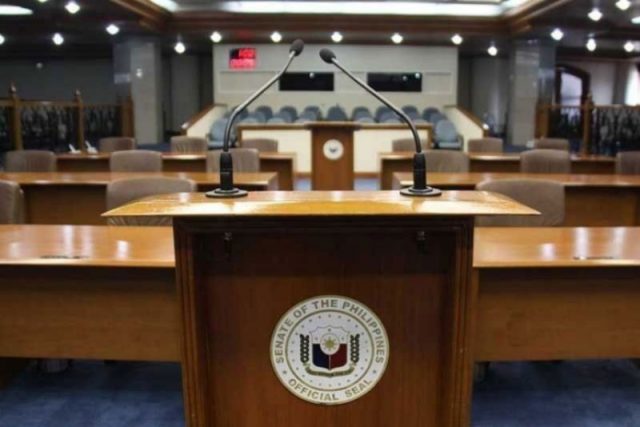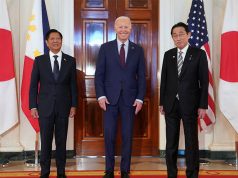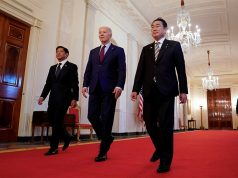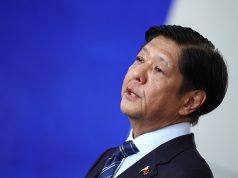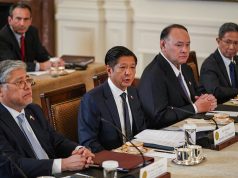The contentious sovereign wealth fund bill was approved in the Senate in a plenary session that lasted until the wee hours of Wednesday morning.
Senate Bill No. 2020, also known as the Maharlika Investment Fund Act of 2023 in the 19th Congress, was passed by the upper chamber with 19 lawmakers voting in the affirmative.
Reports said the approved legislative measure was a consolidation of two bills — Senate Bill No. 1670 by Sen. Mark Villar and Senate Bill No. 1814 by Sen. Raffy Tulfo.
Discussions in the upper chamber took more than 10 hours and ended at 2:32 a.m. on May 31.
Since President Ferdinand Marcos Jr. has certified the bill seeking to create the Maharlika Wealth Fund as “urgent,” the measure breezed through the Senate without the usual waiting period that bills go through.
Bills usually go through three readings on separate days.
If there is a presidential certification tagging it as urgent, the bill bypasses the three-day rule or the constitutional requirement for bills to be approved on the third and final reading three days after it gets approved on second reading.
These readings allow lawmakers to discuss and deliberate on the bill before it finally gets enacted into law. These include tackling proposals or revisions.
Each congressional chamber holds its own readings, with the House of Representatives holding it three times. Once it gets approved, the bill gets transmitted to the Senate with the same procedure.
Once approved by both chambers, a bicameral conference committee is then formed to reconcile the amendments of the two bills. After it gets finalized, the bill goes to the president’s desk for signature or to be vetoed.
For Senate Bill No. 2020, it received 19 affirmative votes, one negative vote, and one abstention. Here are the following votes:
Affirmative (Yes)
- Sonny Angara
- Alan Peter Cayetano
- Pia Cayetano
- Bato Dela Rosa
- JV Ejercito
- Jinggoy Estrada
- Win Gatchalian
- Bong Go
- Lito Lapid
- Loren Legarda
- Robin Padilla
- Grace Poe
- Bong Revilla
- Francis Tolentino
- Raffy Tulfo
- Cynthia Villar
- Mark Villar
- Joel Villanueva
- Juan Miguel Zubiri
Negative (No)
- Risa Hontiveros
Abstention (Abstain)
- Nancy Binay
Absent (Not Present)
- Chiz Escudero
- Imee Marcos
- Koko Pimentel
Hontiveros, the only one who voted on the negative, shared her thoughts on social media following the bill’s passage in their chamber.
According to her, the sovereign wealth fund is “ahead of its time.”
“My belief is that the idea of a sovereign wealth fund will make sense sometime in the medium term, perhaps when we have the surpluses,” she said in a Facebook post hours after their discussions ended.
“But at this time, I think that what we need is to capitalize our GOCC’s so that they can venture where the private sector hesitates to go into utility-scale batteries, cold storage for fish and vegetables, PUV modernization,” Hontiveros added.
GOCC is short for government-owned and controlled corporations.
“But it is not, in my mind, a Maharlika Fund that is fit for this purpose. These challenges require the sub-sector specific knowledge of risks, opportunities and regulatory challenges that our GOCCs possess,” the opposition senator continued.
“At a later time, years from now, after the GOCCs have soaked up the little capital that we have and solved the problems that are most real to Filipinos — it is at that point I think that the capabilities of a Sovereign Wealth Fund would have come into consideration,” Hontiveros further said.
Pimentel, meanwhile, delivered a turno en contra speech where he voiced his concern over the contentious Maharlika Investment Fund, opposing the senate bill’s passage.
“Turno en contra” translates to “the turn to speak against.”
“The overall risk is too great that it outweighs whatever the potential benefits of the measure are, if there is any at all. With our current fiscal and economic situation, we cannot afford to make a P500-billion mistake, or even a P75-billion mistake,” he said on Tuesday.
“How could a fund with promised benefits to be felt 10 to 20 years from now be the answer to an existing public calamity or emergency? Who can answer that?” the senate minority leader added.
Pimentel also believed that the bill was “unjustified and unneeded.”
He likewise warned of the sovereign wealth fund’s possible misuse and abuse of public funds and of crony capitalism due to provisions giving the Maharlika Investment Corporation (MIC) — the entity which would manage the MIF — a “magnitude of powers and privileges.”
“Too many details,” he said, were left to the measure’s implementing rules and regulations.
“The implications of the proposed Maharlika Investment Fund are simply too great for us not to do anything to stop it,” Pimentel added in rejecting the Senate bill.
According to a report by Philstar.com, the Senate version of the contentious Maharlika Investment Fund had major changes.
Their version stated that the Maharlika Investment Corp’s funding will come from government financial institutions.
These include the Land Bank of the Philippines, the Development Bank of the Philippines, the Philippine Gaming Corp, and the Bangko Sentral ng Pilipinas.
The Maharlika Investment Fund is supposed to generate income for the government and help promote economic development.

